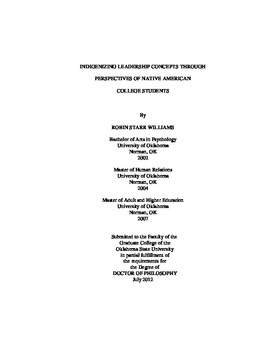| dc.contributor.advisor | Wanger, Stephen | |
| dc.contributor.author | Williams, Robin Starr | |
| dc.date.accessioned | 2013-11-26T08:33:27Z | |
| dc.date.available | 2013-11-26T08:33:27Z | |
| dc.date.issued | 2012-07 | |
| dc.identifier.uri | https://hdl.handle.net/11244/7286 | |
| dc.description.abstract | Scope and Method of Study: This study used a qualitative approach incorporating the use of focus groups and one-on-one interviews. Participants were chosen using purposive sampling through identification by Native American student affairs professionals at five Predominantly White Institutions (PWI). At four PWIs four participants were selected at each institution, and at one PWI five participants were selected, representing a total of 21 participants. The inclusion of these geographic regions acknowledges the varying and unique perspectives of Native college students and tribal people regarding leadership and leadership development. | |
| dc.description.abstract | Findings and Conclusions: The findings from this study were that the Native student leaders in Native student organization (NSO) have been impacted by their experiences in ways that were rewarding, supportive and increased participation. The benefits found from being in a NSO included communicating and networking, building a community on campus, representing Native students on campus, and being a role model. The barriers that the Native student leaders saw was transitioning into leadership, miscommunication, membership, and time required to be in a leadership position. The students also provided insight in the impact on motivation to continue to pursue a degree and on their definition of leadership through their Native student leadership experiences. What also arose from the voices of Native students were the observations they had of Indigenous leadership in the NSO and in general. The Native student leaders had every intention of giving back to their home communities and universities in the form of mentoring younger Native students, recruiting and increasing Native visibility in their respective profession, and building leadership and general skills to give back to the community and profession. Lastly, the Native student leaders were asked to describe important characteristics and values necessary for a Native student leader to have in a university and tribal setting. the values and characteristics found were the same in being committed, proactive, respectful and humble in both settings with exception to the university setting where Native student leaders thought it was important to be open minded. When the Native students described Indigenous leadership, the overarching descriptive terms that arose were commitment, community and cooperation. | |
| dc.format | application/pdf | |
| dc.language | en_US | |
| dc.rights | Copyright is held by the author who has granted the Oklahoma State University Library the non-exclusive right to share this material in its institutional repository. Contact Digital Library Services at lib-dls@okstate.edu or 405-744-9161 for the permission policy on the use, reproduction or distribution of this material. | |
| dc.title | Indigenizing leadership concepts through perspectives of Native American college students | |
| dc.contributor.committeeMember | Krumm, Bernita | |
| dc.contributor.committeeMember | Moore, Tami | |
| dc.contributor.committeeMember | Dorton Clark, Julz | |
| osu.filename | Williams_okstate_0664D_12155.pdf | |
| osu.accesstype | Open Access | |
| dc.type.genre | Dissertation | |
| dc.type.material | Text | |
| dc.subject.keywords | indigenous leadership | |
| dc.subject.keywords | indigenous leadership development | |
| dc.subject.keywords | native american college leadership development | |
| dc.subject.keywords | native | |
| thesis.degree.discipline | Educational Leadership and Policy Studies | |
| thesis.degree.grantor | Oklahoma State University | |
